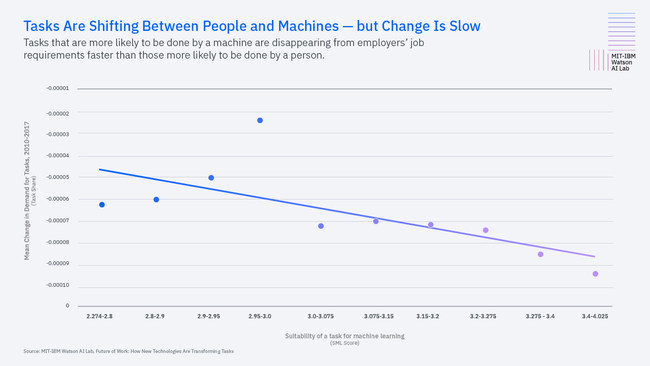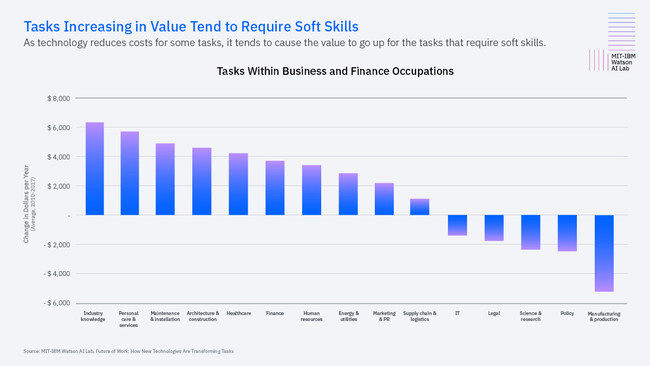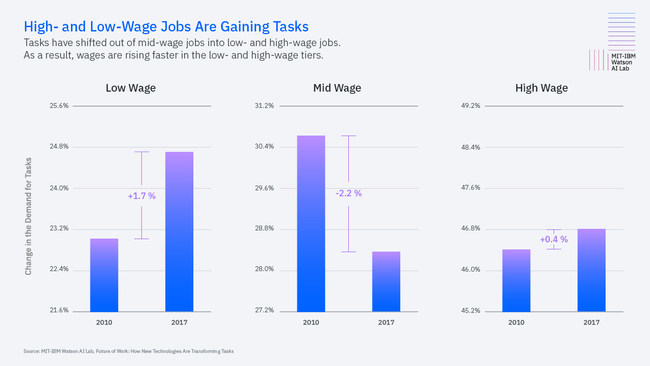First-of-its-kind empirical research from MIT-IBM Watson Labs analyzed 170 million online job postings, uncovering how jobs are changing
IBM believes 100% of jobs will eventually change due to artificial intelligence, and new empirical research released today from the MIT-IBM Watson AI Lab reveals how.
The research, The Future of Work: How New Technologies Are Transforming Tasks, used advanced machine learning techniques to analyze 170 million online job postings in the United States between 2010 and 2017. It shows, in the early stages of AI adoption, how tasks of individual jobs are transforming and the impact on employment and wages.
“As new technologies continue to scale within businesses and across industries, it is our responsibility as innovators to understand not only the business process implications, but also the societal impact,” said Martin Fleming, vice president and chief economist of IBM. “To that end, this empirical research from the MIT-IBM Watson AI Lab sheds new light on how tasks are reorganizing between people and machines as a result of AI and new technologies.”
RESEARCH FINDINGS:
While most jobs will change as new technologies, such as AI, scale, the research shows few jobs will actually disappear. What is fundamentally changing is the way we work.The key findings include:
Tasks are Shifting Between People and Machines – But the Change is Slow
With strong employment growth and workforce transformation underway, the overall demand for tasks that make up occupations are down between 2010 and 2017. Across more than 18,500 tasks, for each occupation, on average, workers were asked to perform 3.7 fewer tasks overall in 2017 than seven years earlier.
Tasks that are more likely to be done by AI or machine learning are disappearing from employers’ job requirements more often than those more likely to be done by a worker. The decreased task requirements may likely be due to employers seeking greater focus from workers and the early adoption of AI and machine learning, indicating a fundamental shift in the way work gets done.
When looking at the impact of AI and machine learning on tasks across the seven years, the data show:
- Among tasks that are more suitable for machine learning (e.g., scheduling, credential validation), workers, by occupation, were asked to perform 4.3 fewer tasks.
- Among tasks that are less suitable for machine learning (e.g., design, industry knowledge), workers, by occupation, were asked to perform 2.9 fewer tasks.
- This reflects a 46% larger decline in demand for tasks that are more likely to be suitable for machine learning, compared to those that are less likely.
Tasks Increasing in Value Tend to Require “Soft Skills”
As technology reduces the cost of some tasks, the value of the remaining tasks that make up an occupation increases. Tasks that are grounded in intellectual skill and insight as well as require, to some degree, physical flexibility, common sense, judgment, intuition, creativity, and spoken language have tended to increase in value.
Here are a few examples across wage ranges and occupations:
- In high-wage business and finance occupations, industry knowledge tasks are on the rise. The annual wages for industry knowledge tasks have increased in value between 2010 – 2017 by $6,387 on average, while the annual wages for manufacturing and production tasks have decreased in value by $5,218 per year, on average.
- In low-wage personal care and services occupations (hairstylists, recreational workers, fitness trainers, etc.), annual wages for design tasks – like presentation design or digital design – have increased between 2010 – 2017 by $12,000, on average among these workers.
- In fact, design tasks – graphic and visual design, industrial design, user interface, user experience, and presentation design – have increased in value consistently across occupations and wage groups. In mid-wage sales occupations, the value of design tasks increased annually by $8,522. And, in high-wage computer and mathematics occupations, the value of design tasks increased annually by $6,011.
These findings align with the recent IBM Institute for Business Value (IBV) study, The Enterprise Guide to Closing the Skills Gap, which reported the two top skills sought in 2018 were behavioral skills – time management and willingness to be flexible, agile, and adaptable to change.
High- and Low-Wage Jobs are Gaining Tasks and Earning More
Among the three tiers – low-wage jobs, mid-wage jobs and high-wage jobs – workers in the middle tier are being squeezed. The data show:
- Tasks have shifted out of mid-wage jobs into low- and high-wage jobs at a rate of 4-to-1.
- As a result, wages are rising faster in the low- and high-wage tiers, than in the mid-wage tier.
- Low-wage workers gained an average of $600 in annual compensation more than mid-wage workers. High-wage workers gained an average of $1,200 in annual compensation more than mid-wage workers over the same period.
New technologies like AI have just begun to transform work and while the rate and pace of change is slow now, it will likely accelerate as more AI solutions are adopted throughout the economy. Workers have time to adapt by learning or honing skills that require innovation, creative thinking, or deep insight and experience. Meanwhile, employers across all industries should begin to focus on reskilling their workforces, redesigning job roles and supporting career advancement.



